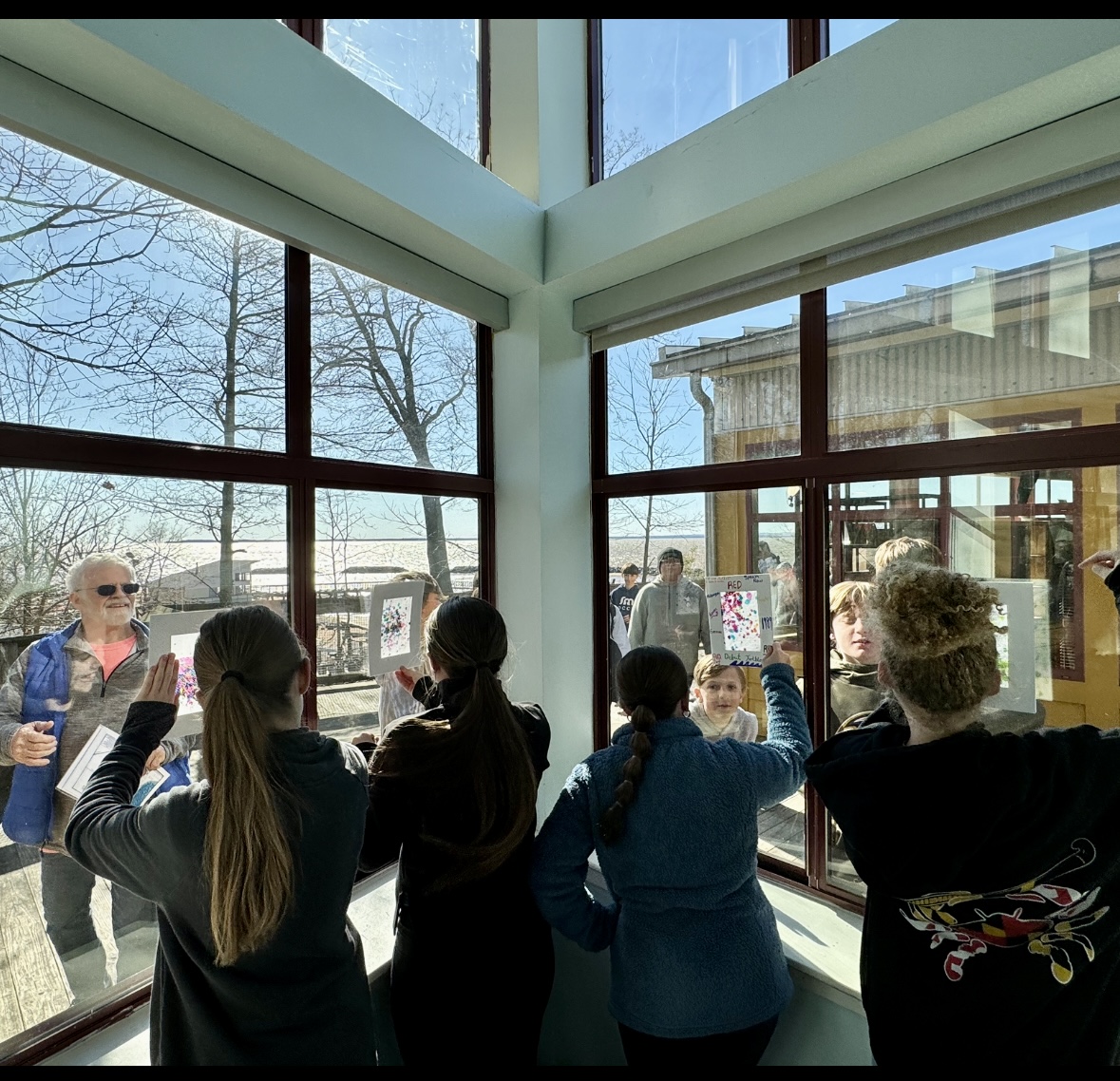Middle School (6th-8th) at St. Margaret School
At St. Margaret School, our Middle School program provides a dynamic and enriching educational experience that prepares students in grades 6th–8th for the challenges and opportunities of high school and beyond. In our departmentalized setting, students learn from subject specialists who are passionate about their areas of expertise, fostering a collaborative and cross-curricular approach to learning.
In our Middle School program, students not only delve deeper into core subjects but also acquire essential life skills such as time management and note-taking. Through a supportive learning environment and personalized guidance, students develop self-confidence and independence, laying a strong foundation for success.
At St. Margaret School’s Middle School, we are committed to fostering academic excellence, personal growth, and lifelong learning. Our comprehensive program equips students with the skills, knowledge, and confidence they need to prepare them to become thoughtful, engaged, and successful members of their communities.
Middle School By The Numbers
Student to Teacher Ratio in Grades 6-8
Different Zip Codes Represented
Total Number of Students in the Elementary School

Middle School Overview
At St. Margaret School, our Middle School program is designed to equip students with the academic skills, self-confidence, and critical thinking abilities necessary for success in High School and beyond. Through a departmentalized setting and a cross-curricular team approach, students in grades 6th–8th benefit from specialized instruction by subject specialists, fostering a deep understanding of core subjects. Our accelerated curricula in math, science (including laboratory courses), and English challenge students to excel academically, while technology integration through project-based learning fosters digital literacy and problem-solving abilities. In language arts, students refine their writing, critical thinking, and analytic skills, enabling them to effectively articulate ideas across academic disciplines. By providing a comprehensive educational experience that emphasizes academic excellence and personal growth, St. Margaret School ensures that students are well-prepared for the challenges and opportunities of high school and beyond.
FAQs about Middle School
Daily Schedule
Middle School hours are from 7:30 am to 2:30 pm.
Schedule:
Homeroom – 7:40 am – 7:45 am daily
Class periods – 8 blocks of 43 minutes each
Lunch/Recess – 40 minute period
Dismissal – 2:26 pm – 2:30 pm daily
Weekly School Mass – Wednesday mornings
Student Activities
- Sports:
- Boys and girls soccer
- Basketball
- Lacrosse
- Chorus
- Band
- Creative arts
- Communication club
- Photography club
- Trivia Club
- Student Council
- Service Club
- Calm Coloring Club
- Rosary Club
Subject Areas
As a distinguished Catholic school located in Bel Air, MD, St. Margaret School is dedicated to providing our elementary students with a robust academic foundation. Our middle school curriculum prioritizes the foundational subjects of Religion, Mathematics, and English Language Arts, ensuring students develop a strong academic footing.
In Religion, students follow the Archdiocese of Baltimore’s curriculum, fostering values and community. Mathematics instruction encompasses fundamental concepts such as counting, subitizing, and measurement, laying the groundwork for numerical fluency. English Language Arts instruction cultivates curiosity, active reading, and vocabulary development, promoting strong communication skills.
Alongside these core subjects, our curriculum also includes enriching opportunities in Science, Instructional Technology, Social Studies, Visual and Performing Arts, Physical Education/Health, and World Languages. Through these additional subject areas, students engage in hands-on exploration, critical thinking, creativity, and global awareness, further enhancing their educational experience.
Religion
“Bringing Good News” is the Archdiocese of Baltimore Religion Curriculum for Elementary Schools. This standards-based curriculum serves as a guide, a road map for both teachers and students as they embark on a journey, which will provide them with the knowledge and understanding of the faith as witnessed in the teachings and the traditions of the Catholic Church. The curriculum is built on the Six Tasks of Catechesis: Promoting Knowledge of the Faith; Liturgical Education; Moral Formation; Teaching to Pray; Education for Community Life; and Missionary Initiation and is aligned with the Assessment of Catholic Religious Education (IFG:ACRE).
By the completion of sixth grade, students will master a variety of skills including:
- Explain that at the end of time, Christ will return and we will be held accountable for how we responded to the gift of faith and helped to build the Kingdom of God.
- Trace the unfolding of God’s revelation through the history of the Chosen People ‐ the Jewish People.
- Describe each of the seven sacraments as entrusted to the Church.
- Indicate how the Decalogue relates to current moral issues and leads to greater understanding of the Gospel through the Great Commandment.
- Discuss evangelization as central to the mission of the Church in which we all have a role.
By the completion of seventh grade, students will master a variety of skills including:
- Recognize that the Bible has both divine and human authorship initiated by God to reveal the truths God intends.
- Investigate the fruits of the Sacrament of Baptism to include forgiveness of all sins, birth into a new life, and a share in Christ’s three‐fold mission as priest, prophet, and king.
- Explain how a well‐formed conscience is developed through the knowledge of Scripture and Church doctrine as well as the witness of Church leaders and faithful role models, past and present.
- Explain the importance of Christians taking an active part in public life and promoting the common good.
- Discuss the call to religious life in the Church which is identified in two forms: active and contemplative.
By the completion of eighth grade, students will master a variety of skills including:
- Understand that Jesus’ paschal mystery, that is his life, passion, death, resurrection and ascension, are central to Jesus’ mission on earth and the fulfillment of revelation.
- Explain that the context of moral decision‐making within the Catholic Christian tradition reflects the values of human dignity, God’s grace, the virtues, the Holy Spirit, and the teaching of the church.
- Understand that our beliefs are sound and rooted in Apostolic Tradition and Sacred Scripture, as entrusted to the teaching office (Magisterium) of the Church.
- Describe the progress and continuation of the Church’s mission through ecumenical councils, including, but not limited to: the Councils of Nicaea and Chalcedon, Vatican I, Vatican II, Fourth Lateran, Trent, Constantinople, and Ephesus.
- Communicate that our respect of other Christians means that we can both recognize what we share in common but that we also need to be honest about how we differ.
Mathematics
The curriculum for all middle schools in the Archdiocese of Baltimore include the following units:
- Counting and Cardinality
- Operations and Algebraic Thinking
- Measurement and Data
- Numbers and Operations in Base Ten
- Geometry
- Numbers and Operations
Catholic educators never forget that our schools exist to bring our students to Christ. By continuing to implement new standards that are challenging, we work to fulfill the promise of quality Catholic education that educates the whole child, both mind and soul.
By the completion of sixth grade, students will master a variety of skills including:
- Understand ratio concepts and use ratio reasoning to solve problems.
- Reason about and solve one-variable equations and inequalities.
- Represent and analyze quantitative relationships between dependent and independent variables.
- Solve real-world and mathematical problems involving area, surface area, and volume.
- Develop understanding of statistical variability.
By the completion of seventh grade, students will master a variety of skills including:
- Analyze proportional relationships and use them to solve real-world and mathematical problems.
- Use properties of operations to generate equivalent expressions.
- Solve real-life and mathematical problems using numerical and algebraic expressions and equations.
- Draw, construct and describe geometrical figures and describe the relationships between them.
- Use random sampling to draw inferences about a population.
- Investigate chance processes and develop, use, and evaluate probability models.
By the completion of eighth grade, students will master a variety of skills including:
- Know that there are numbers that are not rational, and approximate them by rational numbers.
- Work with radicals and integer exponents.
- Understand the connections between proportional relationships, lines, and linear equations.
- Define, evaluate, and compare functions.
- Understand congruence and similarity using physical models, transparencies, or geometry software.
- Understand and apply the Pythagorean Theorem.
In addition, advanced eighth grade students are offered a higher level course in Algebra. That course of study includes the following units:
- Relationships Between Quantities and Reasoning with Equations
- Linear and Exponential Relationships
- Descriptive Statistics
- Expressions and Equations
- Quadratics Functions and Modeling
English Language Arts
The English Language Arts Curriculum for the Archdiocese of Baltimore is designed using the Catholic, College and Career Ready clusters as its foundation. Through literature, this course of study fosters students’ Catholic identity, shaping them to be models of Christian living for others. This curriculum is fully integrated with our Catholic faith. We provide students with a curriculum that is rigorous and rich in literature, oral and written language, grammar, writing, vocabulary, informational literature, and multimedia/technology.
By the completion of sixth grade, students will master a variety of skills including:
- Use of the process in research writing.
- Use of the process in essay writing.
- Voice and tone in writing emphasized.
- More Focus in Fiction, Genre, and Literary Elements.
- Use of Grammar integration.
- Collaboration, oral presentations, speeches, and technology components incorporated regularly.
By the completion of seventh grade, students will master a variety of skills including:
- Students will be able to write routinely over extended time frames (time for research, reflection, and revision) and shorter time frames (a single sitting or a day or two) for a range of discipline-specific tasks, purposes, and audiences.
- Students will analyze the main ideas and supporting details presented in diverse media and formats and explain how the ideas clarify a topic, text, or issue under study.
- Students should demonstrate understanding of figurative language, word relationships, and nuances in word meanings.
- Students should acquire and use accurately grade-appropriate general academic and domain-specific words and phrases; gather vocabulary knowledge when considering a word or phrase important to comprehension or expression.
By the completion of eighth grade, students will master a variety of skills including:
- Students use their knowledge of word origins and word relationships, as well as historical and literary context clues, to determine the meaning of specialized vocabulary and to comprehend the written word.
- Students read a good representation of narrative and expository text (e.g., classic and contemporary literature, magazines, newspapers, online information).
- Students write clear, coherent, and focused essays. The writing exhibits students’ awareness of audience and purpose. Essays contain formal introductions, supporting evidence, and conclusions.
- Students progress through the stages of the writing process as needed.
- Students write and speak with a command of Standard English writing mechanics including correct grammar and usage that is appropriate to this grade level.
Additional Subject Areas
The following subject areas are currently under revision across the Archdiocese of Baltimore, and if you would like more information regarding these standards and essential skills please contact the school directly.
- Science
- Instructional Technology
- Social Studies
- Visual and Performing Arts
- Physical Education/Health
- World Languages
Ready to Learn More About Our Catholic Middle School in Bel Air, MD?
Discover the excellence of St. Margaret School’s Elementary School Program! Reach out to us with any questions or to arrange a personalized tour, and discover the advantages of a Catholic education designed to nurture your child’s growth. Delve into our comprehensive curriculum, where technology seamlessly enhances learning, arts and music flourish, athletics energize, and a multitude of clubs and extracurricular activities engage students. Join us in crafting a holistic educational journey for your child at St. Margaret School, where excellence thrives within a supportive Catholic community!
Explore St. Margaret School By Grade Level

Early Education (Pre-K3-Pre-K4)

Elementary (K-5)

Middle (6-8)
Ready to Explore St. Margaret School?
Located in Bel Air, Maryland St. Margaret School is a private Catholic School for students in PreK-3 through 8th Grade. To learn more about our school community and the admissions process we encourage you to contact our Admissions team today.




